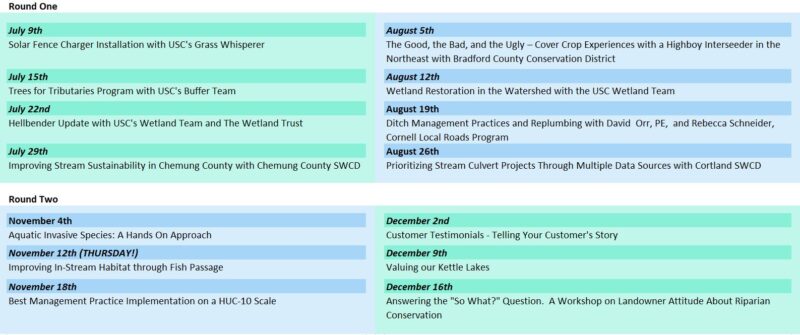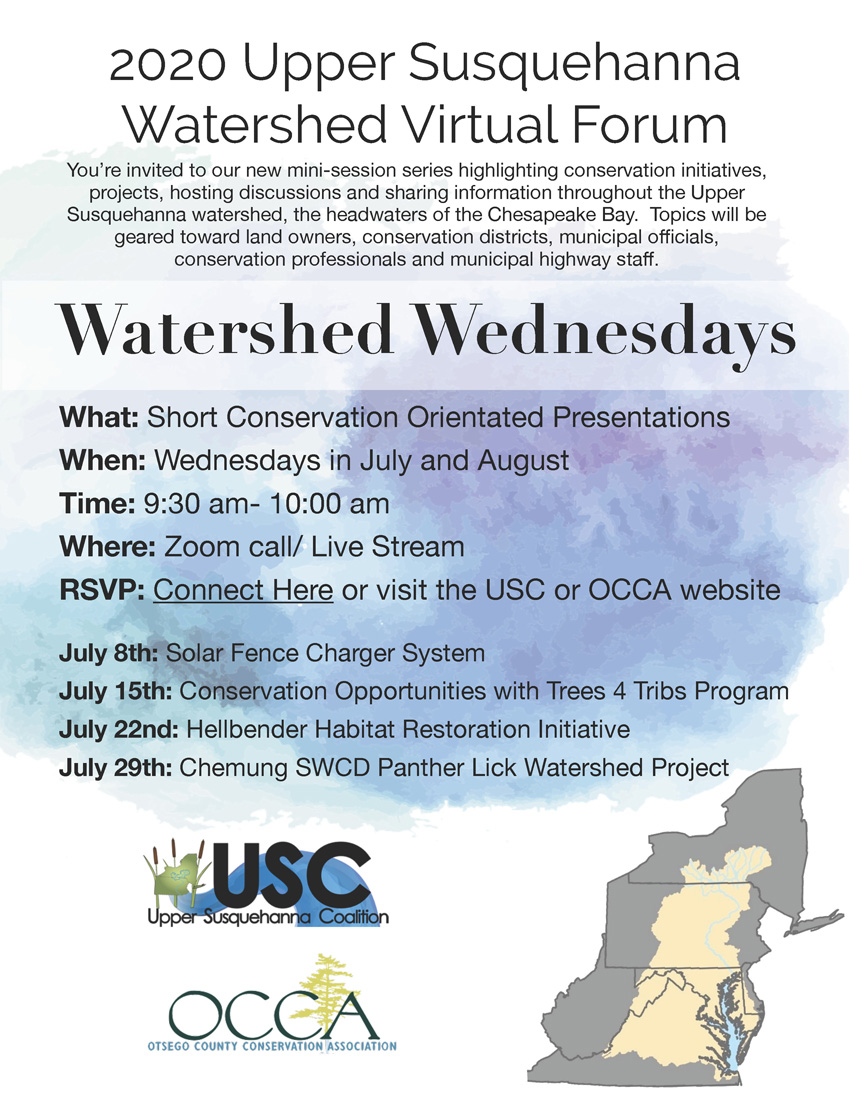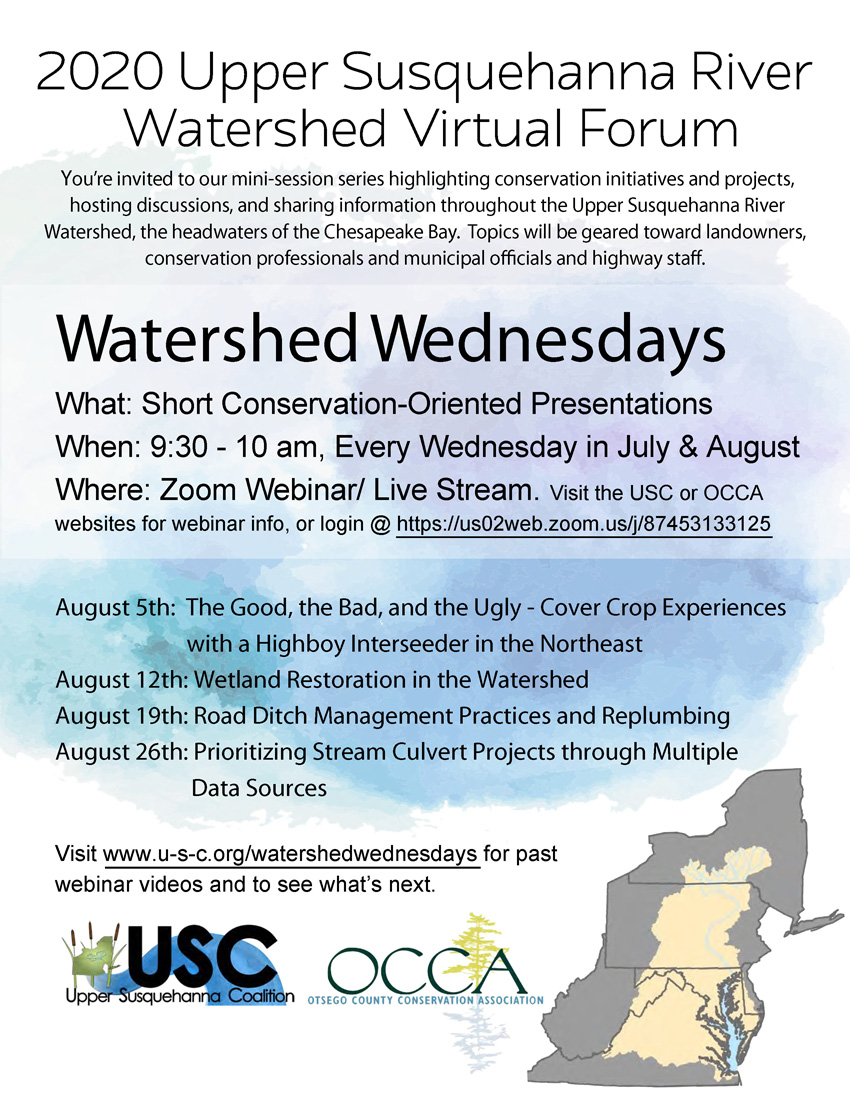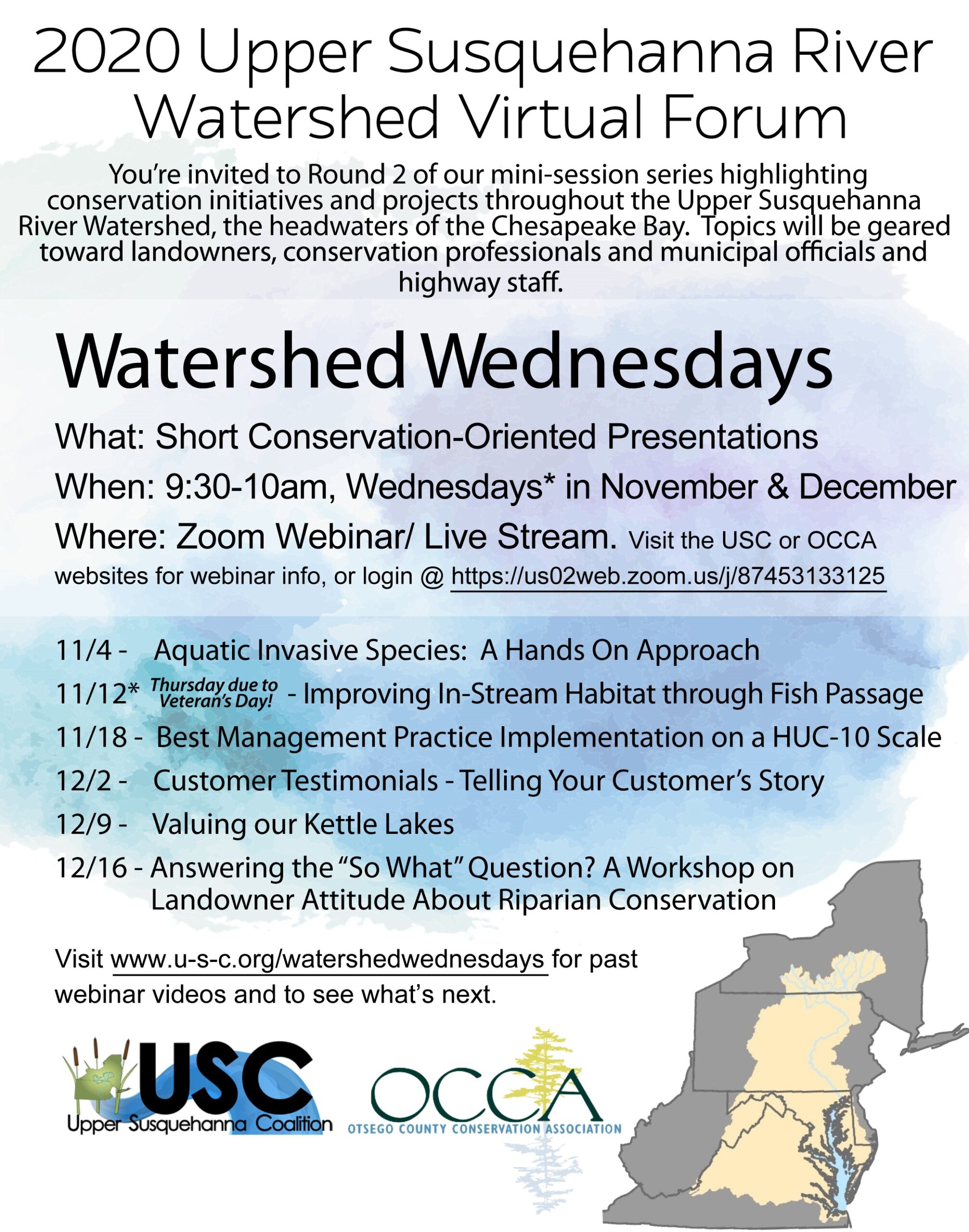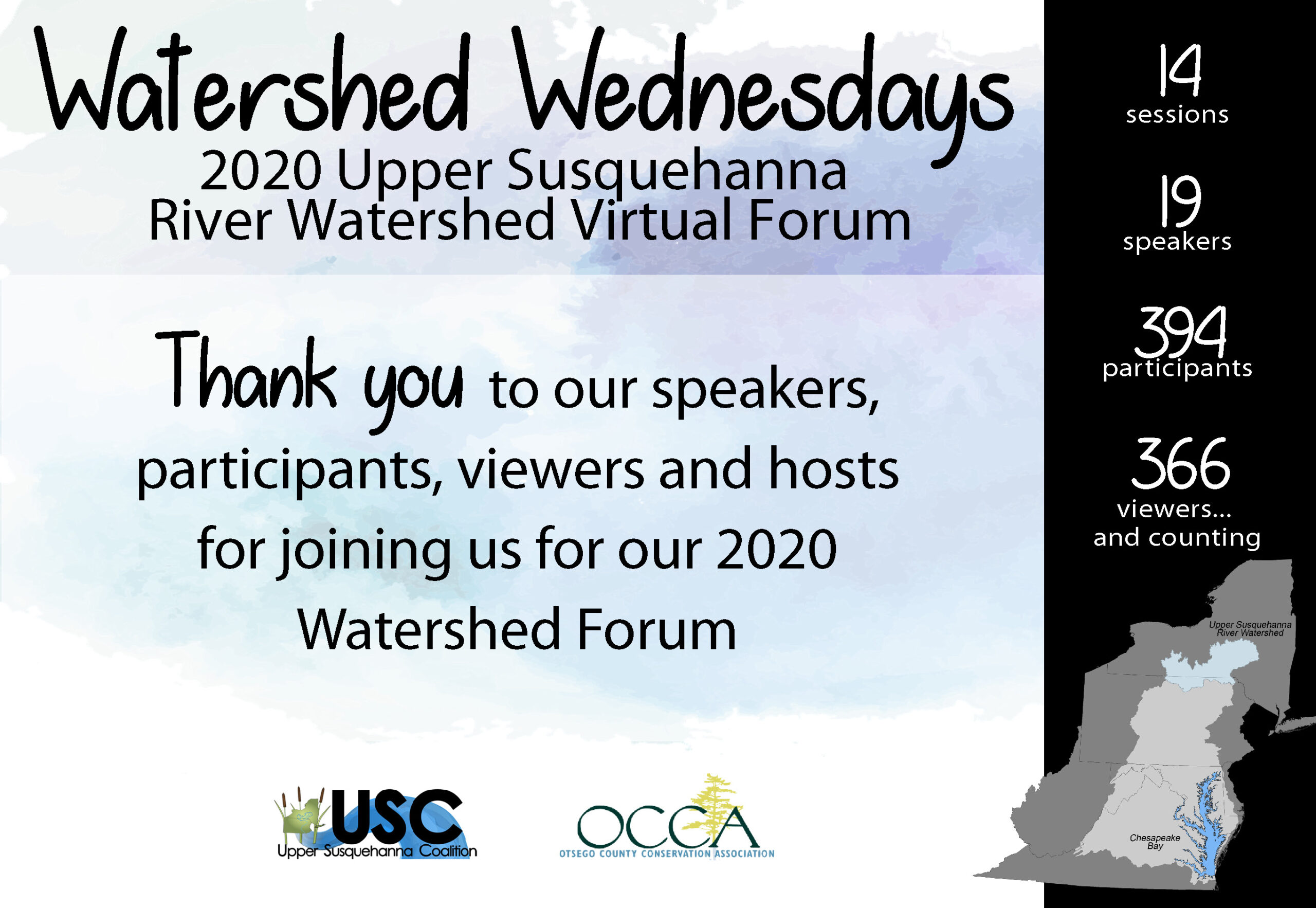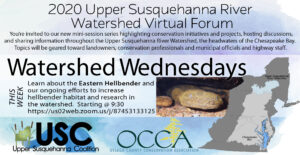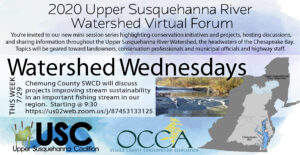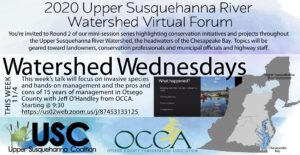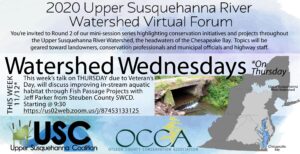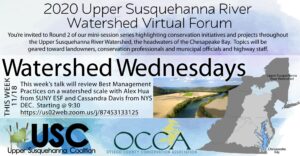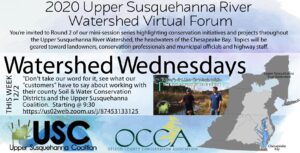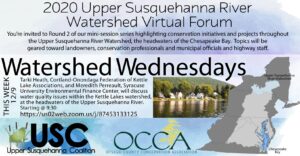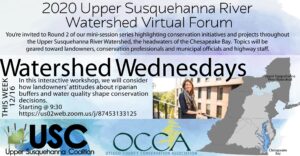Upper Susquehanna River Watershed Forum – Watershed Wednesdays
Return to the main Watershed Wednesdays page
Watershed Wednesdays 2020
With four consecutive years of Watershed Forums hopscotching across the watershed and changing in focus, size and scope, the changes in the 2020 group meetings climate encouraged our planning team to shift gears completely in preparation for the 2020 Upper Susquehanna Watershed Forum. Rather than a centralized one-day meeting, the 2020 forum morphed into mini-sessions every Wednesday through July and August for Round 1, and in November and December (aside from holidays) for Round 2. The mini-session format was designed to encourage participation without interrupting busy schedules or requiring travel. These sessions were focused on a variety of topics related to the watershed, conservation initiatives, and ongoing projects, and video recordings are posted here for future perusal.
We hope you enjoy our 2020 Upper Susquehanna Watershed Forum!
Thanks to our partners and members for assisting in developing Watershed Wednesdays content and to Otsego County Conservation Association for hosting the webinars and providing video recordings.
2020 Webinar Calendar:
Return to the main Watershed Wednesdays page
July 9:
This week’s Watershed Wednesdays topic is the installation of a solar fence charger system and led by Troy Bishopp, our own grass whisperer.
July 15:
This week’s Watershed Wednesdays topic is the New York State’s Trees for Tributaries program. Learn how we can help you get trees and shrubs planted alongside a waterway on your land. This webinar is specifically for landowners and municipalities to understand how Trees for Tributaries an opportunity to engage in reforestation, decrease erosion, reduce flooding damage, improve wildlife habitat and protect water quality.
July 22:
This week’s Watershed Wednesdays topic is a Hellbender Update, and will include a discussion about the ongoing in-stream cover rocks habitat improvement project. USC completed a cover rock habitat improvement project in 2018 prior to the release of juvenile hellbenders with moderate success. Some juveniles were documented utilizing the habitat but the stream conditions are not optimal at this time for long term occupancy. The Wetland Trust (TWT) was able to secure an additional parcel of land that has afforded us the ability to expand the cover rocks upstream into areas with more ideal stream conditions. Approximately 100 slab rocks are stockpiled on-site and are scheduled to be installed in August and ahead of the release of the next cohort of juvenile hellbender scheduled for 2021. On behalf of TWT, USC has received authorization from the USACE and obtained coverage under DEC Article 15 stream disturbance permit.
July 29:
This week’s Watershed Wednesdays topic is a large and diverse project improving stream sustainability in an important trout stream in our region. Chemung SWCD will discuss ongoing projects to support fish passage, improve floodplain health, protect streamside areas from flooding and protect eroding streambanks.
August 5:
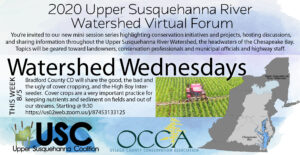
Watershed Wednesdays Week 5
This week’s Watershed Wednesdays topic is cover crops. Cover cropping is probably the most important thing you can do to keep soil and nutrients where they should be, in your field where you can utilize them. However, establishing them in the NE has been challenging. We have operated an inter-seeder for 2 years now and have learned some extremely valuable lessons that will help you in your quest to grow good cover crops. Join us on the 5th to discuss what variables we should be looking at to establish good cover crops.
August 12:
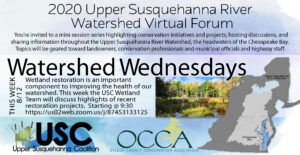
Watershed Wednesdays Week 6
This week’s Watershed Wednesdays topic is wetland restoration, an important component of our watershed management and nutrient reduction efforts. The USC Wetland team will discuss wetland restoration methods, tools and why wetlands should be an important landscape management tool.
August 19:
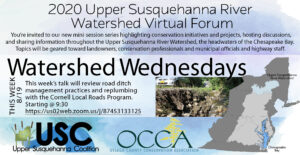
Watershed Wednesdays Week 7
This week’s Watershed Wednesdays topic is road ditch management practices and replumbing. David Orr, PE from Cornell University and the Local Roads Program will discuss their survey of ditch management practices in NYS, an example of a watershed replumbing project in a local county, and some work being done with student interns this summer.
August 26:
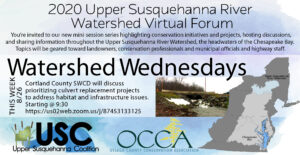
Watershed Wednesdays Week 8
This week’s Watershed Wednesdays topic is prioritizing stream culvert projects through multiple data sources.
Cortland County SWCD has incorporated multiple assessments and datasets to help ensure a holistic and systematic approach to culvert replacement projects addressing habitat and public infrastructure issues. This presentation describes the use of the I4 Assessment, NAACC, Cornell Culvert Model, and Culvert Condition to prioritize culvert and aquatic organism passage projects.
The following is a list of related resources:
North Atlantic Aquatic Connectivity Collaborative: https://streamcontinuity.org/naacc
- Culvert Condition Data Sheet https://streamcontinuity.org/sites/streamcontinuity.org/files/pdf-doc-ppt/Culvert%20Assessment%20Form_2019_082319.pdf
- Conservation Assessment and Prioritization System (CAPS): http://umasscaps.org/index.html
- Critical Linkages Project Description: http://www.umasscaps.org/applications/critical-linkages.html
- NY Data for CAPS and Critical Linkages: http://www.umasscaps.org/data_maps/dsl.html#NY
The Nature Conservancy Datasets-
- Chesapeake and Northeast Aquatic Connectivity Project Description: Stops at NY border but contains rest of Chesapeake Bay watershed Online mapper that has assessed culvert passability (not sure if used NAACC data used) https://www.conservationgateway.org/ConservationByGeography/NorthAmerica/UnitedStates/edc/reportsdata/freshwater/stream/Pages/default.aspx
- Northeast Aquatic Connectivity Project Web Mapper: Online mapper that has assessed culvert passability (not sure if used NAACC or what Data was used) https://maps.freshwaternetwork.org/northeast/
- Active River Area: floodplain assessment looking at lands connected to streams during floods that might be worth protecting or looking into retention projects etc. https://www.conservationgateway.org/ConservationByGeography/NorthAmerica/UnitedStates/edc/reportsdata/freshwater/floodplains/Pages/default.aspx
- Lake Champlain Basic Road-Stream Crossing Assessment http://nyanc-alt.org/gis/Champlain/
Eastern Brook Trout Joint Venture: https://easternbrooktrout.org/assessment-data/brook-trout-assessment-data/ebtjv-sub-watersheds
Cornell Culvert Model: https://wri.cals.cornell.edu/sites/wri.cals.cornell.edu/files/shared/CornellCulvertsModelInstructions_RevisedAug2018.pdf
November 4:
Since 2006, Otsego County Conservation Association has taken a hands-on approach when dealing with the problem of aquatic invasive species in several waterbodies. OCCA program director, Jeff O’Handley will review 15 years of AIS control projects in Otsego County and will discuss the pros and cons of OCCA’s experience – is the hands-on approach right for you?”
November 18:
This week’s Watershed Wednesdays topic is Best Management Practice Implementation on a HUC-10 Scale. The Upper Susquehanna Coalition have been actively implementing various best management practices (BMP) in southern New York, helping the state to reach its nutrient reduction targets as part of the Chesapeake Bay TMDL (Total Maximum Daily Load). We conducted a series of analyses to compare the relationships between BMP implementations and the water quality measurements collected through the Nontidal Network (NTN) gaging stations and the Rotating Integrated Basin Studies (RIBS). In addition, we sought to identify the proportion of land uses for each HUC10 as well as the land use proportions of an estimated riparian management zone in their respective HUC10 region.
December 2:
Don’t take our word for it, see what our “customers” have to say about working with their county Soil & Water Conservation Districts and the Upper Susquehanna Coalition. Telling your story is important in building credible relationships with customers and partners, and producing these videos gets the word out about how we are helping to improve water quality through various implementation projects throughout the Upper Susquehanna River Watershed.
December 9:
Tarki Heath, Cortland-
December 16:
How do we best encourage private landowners to implement conser
.
Return to the main Watershed Wednesdays page

